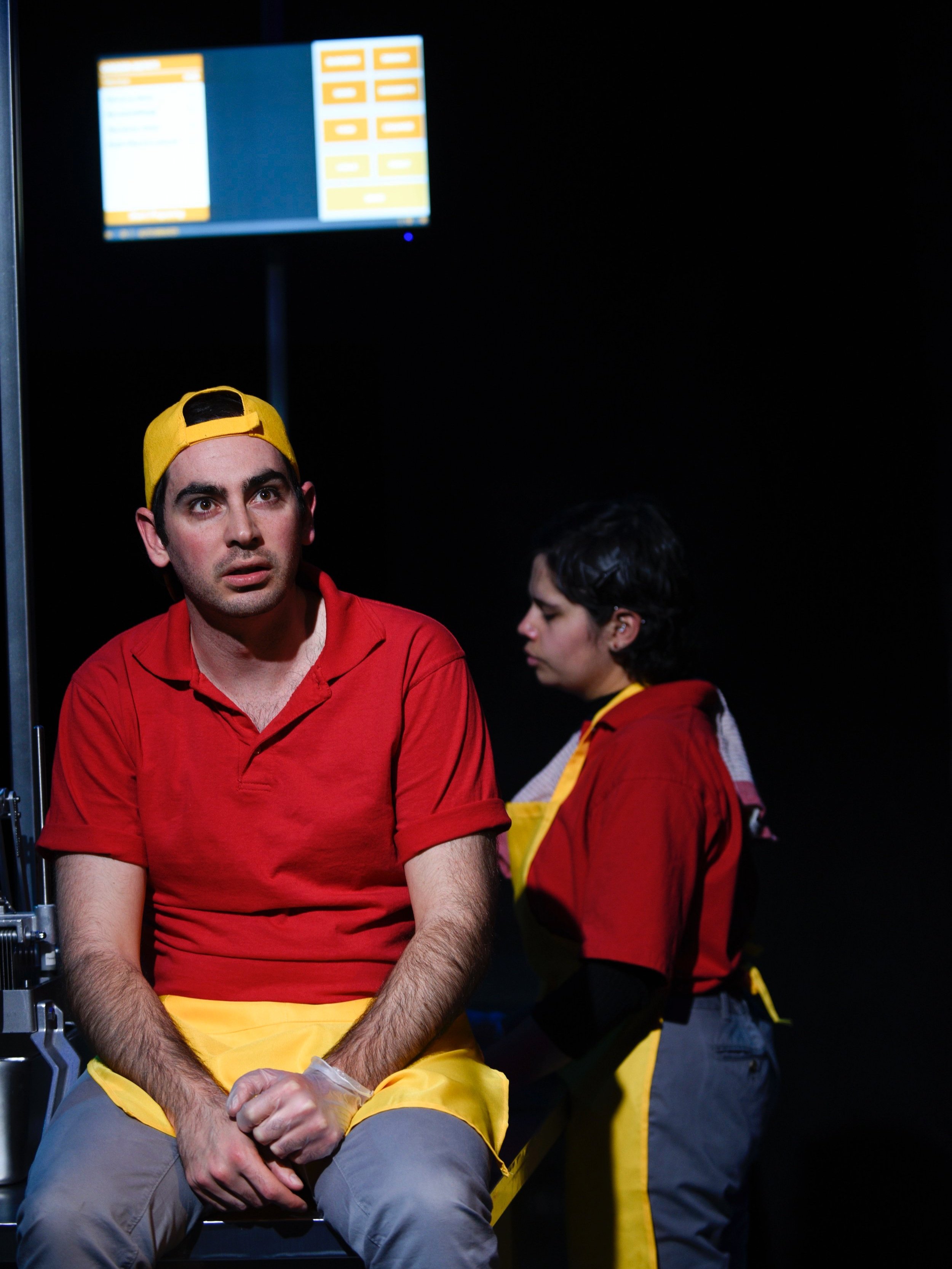Fast Food by Morgan Rose -reviewed by Tim Byrne
It’s Prince Hal in Shakespeare’s Henry IV, Part 1, who says it best: “If all the year were playing holidays, to sport would be as tedious as to work”. While it might be a curious observation for a prince to make, it’s certainly something the rest of us can understand all too well, and it’s an idea that animates Morgan Rose’s new world premiere play for Red Stitch, Fast Food. Set in an interchangeable burger joint – of the towering corporate magnitude of a McDonald’s or Hungry Jacks – it tracks four workers and their manager through a single morning, prepping food stations, cleaning floors and bench tops, and occasionally making burgers.
Kevin Hofbauer and Casey Filips in Fast Food. All production photo by Jodie Hutchinson.
There is a sense that Rose has either done a stint in the fast food industry or embedded herself there for New Journalism purposes, because the verisimilitude is uncanny. Sophie Woodward’s design conjures the soulless gleam of the work station, its economy of space belying the pressures exerted on its workers. The play opens with the characters coming in to start their shifts, the blinking stares and somnambulant movements speaking to the general lack of enthusiasm.
Chi Nguyen and Isha Menon in Fast Food.
There are Leonard (Casey Filips) and G (Isha Menon), who’ve both had hard nights but probably couldn’t have mustered more liveliness if they hadn’t. There is River (Chi Nguyen), who tries too hard to disguise her obsequiousness. There is Rosemary (Ella Caldwell), who seems far too old and out of her depth in the job. And then there is manager Troy (Kevin Hofbauer), who initially feels like the epitome of corporate toadyism, officious and patronising.
For a while, the workers go about their work; the minutiae of workplace culture is keenly observed, a portrait of the charmless quotidian. But suddenly Leonard falls into a fugue, visualising himself somewhere else: specifically, in a utopian beach house with an imaginary girlfriend. And soon, all the workers start to drift off into their own fantasies. River imagines a sexual relationship with G. Rosemary falls into a reverie involving her childhood My Little Pony toy. Even Troy starts to imagine he’s rescuing people from a flood.
Casey Filips & Ella Caldwell in Fast Food.
From here on, the play seesaws from the hyperreal to the surreal and back again like a metronome. At first, it feels as if Rose is making a comment on the stultifying monotony of work – a simple repudiation of mass production and the human cost of economies of scale. And while that aspect of the script remains in play, soon another idea creeps in, one that more closely elucidates Prince Hal’s idea of the tedium of idleness.
A long, languid period of relaxation occurs, where the characters seem to fall into Leonard’s fantasy and take up residence in his imaginary beach house. But not all is lounging and strawberries. Eventually, power dynamics have to be delineated, tasks allocated, resources rationed. It seems work, even in play, is unavoidable, inevitable.
Director Bridget Balodis & writer Morgan Rose.
Director Bridget Balodis elicits some beautiful performances from the cast, something so ubiquitous in the Red Stitch playbook it no longer surprises. Menon has a wonderfully sly hint of sadism roiling under the surface, and Filips is hilariously dopey as the slovenly Leonard. Nguyen is a spiky and rather endearing River, although she could let loose more in her sexual fantasy. Hofbauer brilliantly shifts his character from weasel to hero and back again, in one of the more complex performances of the night. Best of all is Caldwell, who manages to make Rosemary pathetic and poignant, a victim of circumstance and regret who finds reserves of grit and compassion in the unlikeliest of places.
Rose is a major Australian playwright, and Fast Food is a welcome addition to her body of work, a kind of midway point between Annie Baker and Caryl Churchill. It does feel sometimes like a play in search of a climax, and structurally it doesn’t take enough advantage of its tonal shifts. There is a ratcheting of tension in the first half that largely dissipates when the workers clock off into their fantasy world. This affects the pacing in the second half, from which the play doesn’t really recover. But it remains a fascinating, often outrageously funny, exploration of the culture of work, of how we relate to our work and our fellow workers. It is a reminder that even in the depths of corporatism, humanity thrives.
Casey Filips, Isha Menon, Kevin Hofbauer and Ella Caldwell in Fast Food.
Book now for Fast Food by Morgan Rose (May 13 – June 5).








